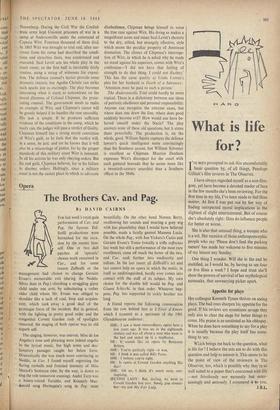Opera
The Brothers Cay. and Pag.
By DAVID CAIRNS FOR last week's royal gala performance of Cay. and Pag. the famous Zef- firelli productions were burnished for the occa- sion by the master him- self. One or two dull patches of 'operatic' chorus work remained in Cay., and for some reason Zeffirelli or the management had chosen to change Geraint Evans's memorable exit (during the Nedda- Silvio duet in Pag.) clutching a struggling gipsy child under one arm, by substituting a rather older child whom Mr. Evans was obliged to shoulder like a sack of coal, limp and acquies- cent, which took away a good deal of the grotesque force of the incident. But in general, with the lighting in pretty good order and the congenital Covent Garden rash of spotlights removed, the staging of both operas was its old superb self.
The singing, however, was uneven. Miss de los Angeles's tone and phrasing were indeed angelic in the lyrical music, but high notes and dec- lamatory passages caught her below form. Dramatically she was much more convincing as Nedda; in Cay. I found myself regretting the flaring eyeballs and frenzied intensity of Miss Shuard's Santuzza (she, by the way, is down to sing the role tomorrow evening). Andrd Turp was a honey-voiced Turiddu, and Kenneth Mac- donald sang Harlequin's song in Pag. most beautifully. On the other hand Noreen Berry, swallowing her sounds and wearing a grey wig with less plausibility than I would have believed possible, made a fatally genteel Mamma Lucia. On the whole Pag., with Jon Vickers's Canio and Geraint Evans's Tonio (vocally a trifle soflocato last week but still a performance of the most rare excellence), came off much the better of the two, and Cay. sank further into mediocrity and tedium. In the last resort all Zeffirelli's art and tact cannot help an opera in which the music, in itself so undistinguished, hardly ever comes into contact with the stuff of its subject. My own choice for the double bill would be Pag. and Gianni Schicchi, in that order. Whatever hap- pens, Pag. has supported its sickly brother too long.
A friend reports the following conversation from the row behind him at L'Elisir d'Amore which I transmit as a specimen of the 1961 Glyndebourne audience : SHE: I saw a most extraordinary opera here a few years ago. It was set in the eighteenth century and was all about a man who went to the bad and ended up in a madhouse.
HE: Jr sounds like an opera by Benjamin Britten.
SHE: You're perfectly right--it was.
HE: I think it was called Billy Pears.
SHE: 1 believe you're right.
HE: Is opera at Covent Garden anything like this?
SHE: Oh no, 1 think its much more awe- inspiring. .
SECOND LADY: But, darling, we went to Covent Garden last year. Surely you remem: ber—we saw My Fair Lady.










































 Previous page
Previous page